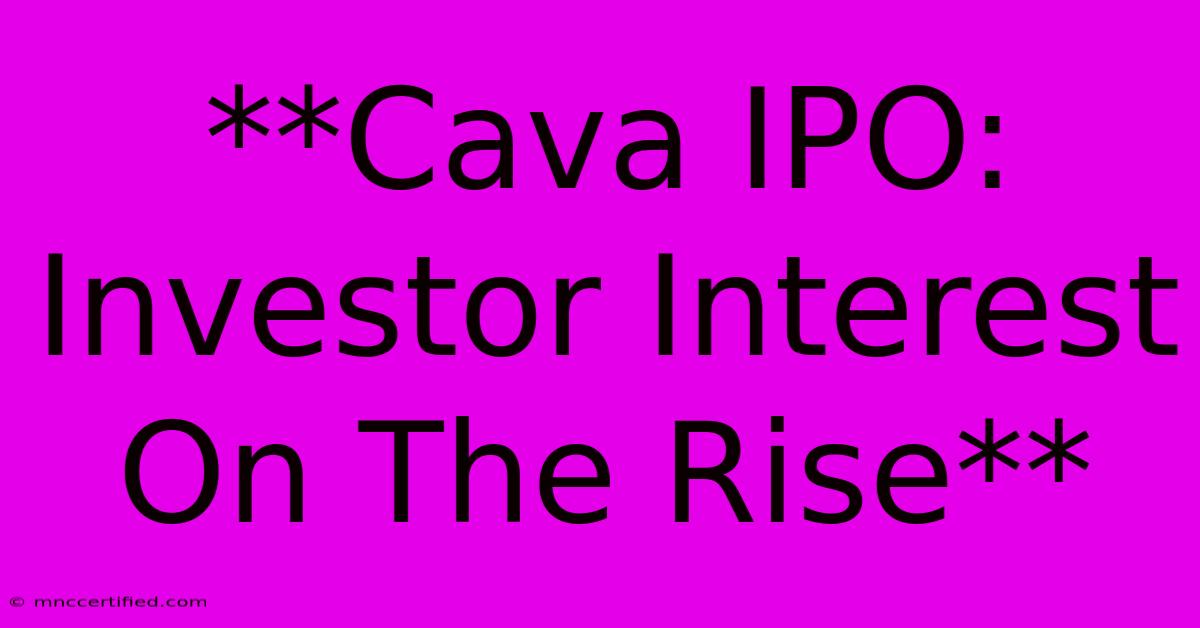**Cava IPO: Investor Interest On The Rise**

Table of Contents
Cava IPO: Investor Interest On The Rise
Cava, the fast-casual Mediterranean restaurant chain, is generating significant buzz as it prepares for its initial public offering (IPO). With a strong brand, loyal customer base, and impressive growth trajectory, Cava's IPO is attracting considerable investor interest. This article delves into the key factors driving this excitement and explores what potential investors should consider.
Cava's Recipe for Success: A Look at the Fundamentals
Cava's success isn't accidental. Several key factors contribute to its appeal to both customers and investors:
-
Strong Brand Recognition and Loyalty: Cava has cultivated a strong brand identity, known for its fresh, customizable Mediterranean bowls, salads, and pitas. This brand loyalty translates into repeat customers and high average order values. This brand strength is a crucial element for investor confidence.
-
Proven Growth Trajectory: The company has demonstrated consistent revenue growth, expanding its footprint through a combination of company-owned and franchised locations. This consistent growth is a major draw for investors looking for stable, long-term returns.
-
Tech-Enabled Operations: Cava leverages technology to enhance efficiency, from online ordering and mobile payments to streamlined kitchen operations. This technological edge allows for better cost management and scalability, key aspects valued by investors.
-
Strategic Expansion Plans: The company's plans for future expansion, both domestically and potentially internationally, further bolster investor confidence. This planned expansion indicates ambitious growth targets and a clear vision for the future.
-
Experienced Management Team: A capable and experienced management team is crucial for any successful company, and Cava's leadership has a proven track record in the restaurant industry. This experienced leadership reassures investors of the company's ability to navigate challenges and capitalize on opportunities.
Assessing the Risks: What Investors Should Consider
While the prospects for Cava look promising, potential investors should also carefully consider the risks involved:
-
Competition: The fast-casual restaurant segment is highly competitive, with established players and new entrants vying for market share. Competitive pressures could impact Cava's growth and profitability.
-
Economic Sensitivity: The restaurant industry is often sensitive to economic downturns. A recession could negatively affect consumer spending on dining out, impacting Cava's performance. Economic volatility is a factor investors need to weigh.
-
Food Costs and Inflation: Fluctuations in food costs and overall inflation can squeeze profit margins. Inflationary pressures need to be considered when evaluating the long-term viability of the investment.
-
Franchise Model Dependence: While franchising allows for faster expansion, it also introduces complexities and potential risks associated with managing franchise relationships. Franchise model risks should be carefully assessed.
The IPO and Investor Interest: What to Expect
The Cava IPO is expected to attract substantial investor interest given the company's strong fundamentals. However, the actual IPO price and market performance will depend on various factors, including overall market conditions and investor sentiment. IPO pricing and market volatility are always unpredictable elements.
Due diligence is crucial for any investor considering participation in the Cava IPO. Thoroughly reviewing the company's financial statements, understanding the risks involved, and seeking professional financial advice are essential steps before making any investment decision.
Conclusion: A Promising Opportunity with Inherent Risks
Cava's IPO presents a potentially attractive investment opportunity for those seeking exposure to the fast-casual restaurant sector. However, investors should carefully weigh the potential benefits against the risks involved and conduct thorough research before committing their capital. The success of the IPO and subsequent performance will depend on a variety of factors, including execution of its growth strategy, managing competitive pressures, and navigating macroeconomic uncertainties. Therefore, a well-informed approach is vital for navigating this potentially lucrative but also risky investment.

Thank you for visiting our website wich cover about **Cava IPO: Investor Interest On The Rise** . We hope the information provided has been useful to you. Feel free to contact us if you have any questions or need further assistance. See you next time and dont miss to bookmark.
Featured Posts
-
Heston Blumenthal Fears Watching His Tv Show
Nov 14, 2024
-
British Actor Timothy West Passes Away
Nov 14, 2024
-
Varma Ton Propels India To T20 Victory
Nov 14, 2024
-
Who Is Sen John Thune
Nov 14, 2024
-
Hegseth Advocate For Military Change Chosen For
Nov 14, 2024